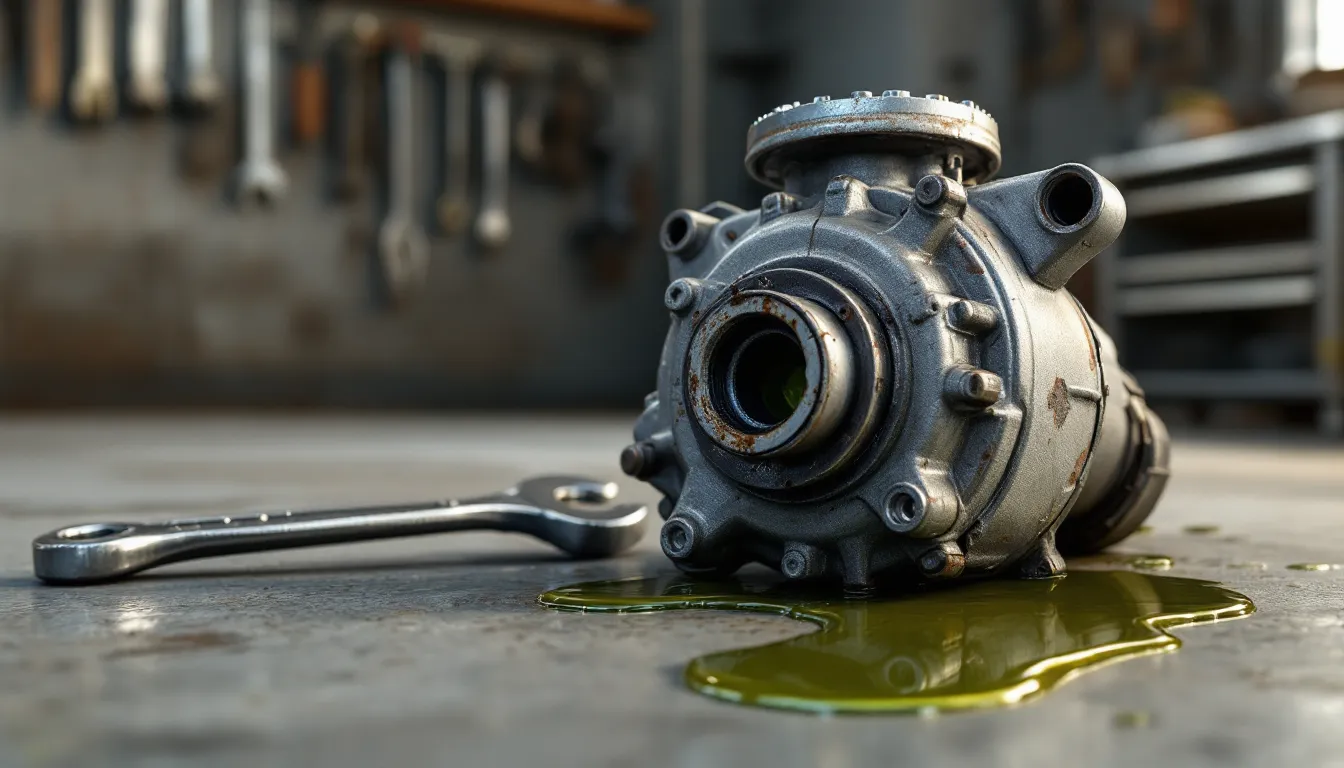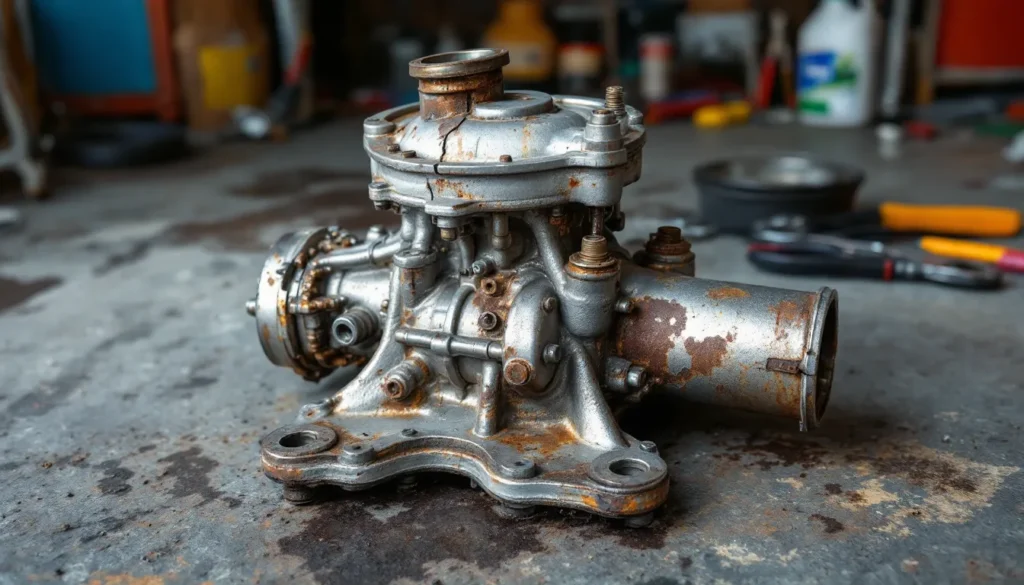Key Takeaways
- Recognize Warning Sounds: Distinct noises such as whining, grinding, or rattling indicate potential water pump failure and should be addressed immediately to avoid costly repairs.
- Understanding Components: Key parts of a water pump, including the impeller, seal, and bearings, play critical roles in maintaining engine temperatures and efficient coolant circulation.
- Common Symptoms: Look out for signs of trouble like coolant leaks, overheating engines, and unusual sounds, as they often point to water pump issues requiring urgent attention.
- Preventative Maintenance: Regular inspections, coolant maintenance, and monitoring engine temperature can help prolong the lifespan of your water pump and prevent significant vehicle damage.
- Immediate Action Required: Hearing a grinding sound or noticing overheating can indicate severe internal damage, necessitating immediate inspection to prevent catastrophic failure of the water pump.
When it comes to your vehicle’s performance, the sound of a bad water pump can be a red flag you shouldn’t ignore. Understanding these sounds can save you from costly repairs down the line and keep your engine running smoothly. If you’ve ever heard strange noises coming from under the hood, you might be wondering what they mean.
A failing water pump often emits distinct sounds that signal trouble. From whining to grinding, these noises can indicate a range of issues, from worn bearings to a loose belt. By recognizing these warning signs early, you can take action before the situation escalates. Let’s dive into the sounds you should listen for and what they could mean for your car’s health.
Understanding Water Pumps
Water pumps are vital components in your vehicle’s cooling system, maintaining optimal engine temperatures. They circulate coolant between the engine and the radiator through a system of hoses. Understanding their function and common issues can aid in early detection of problems.
Components of a Water Pump
- Impeller: The impeller spins to create pressure, driving coolant through the system. If it wears down, it may lead to improper circulation and overheating.
- Seal: The seal prevents coolant from leaking. A damaged seal causes coolant loss, leading to reduced efficiency and potential engine damage.
- Bearing: Bearings support the impeller’s rotation. Worn bearings create unusual noises and vibrations, signaling impending failure.
Common Water Pump Issues
- Leaks: Check for coolant puddles under your vehicle. Leaks indicate seal damage and require immediate attention.
- Noisy Operation: Sounds like whining or grinding often arise from faulty bearings. These sounds signal that the pump’s performance is compromised.
- Overheating: Symptoms like engine temperature spikes suggest that the pump fails to circulate coolant properly. This can result in costly engine repairs.
Signs of a Troubled Water Pump
- Whining noise: Originates from worn bearings. This noise signifies that the pump is working harder than it should.
- Grinding sound: Indicates severe bearing or impeller damage. Ignoring this sound risks complete pump failure.
- Rattling or knocking: Usually signals loose components. It’s crucial to investigate further to prevent additional damage.
By recognizing these components and signs, you can maintain your vehicle’s cooling system effectively, ensuring smooth operation and avoiding costly repairs.
Common Signs of Water Pump Failure

Recognizing the signs of water pump failure can save you from costly repairs and ensure your vehicle runs efficiently. Watch for these key indicators of trouble in your water pump.
Unusual Noises
You might hear specific sounds when a water pump starts to fail. Listen closely for:
- Whining Noises: A high-pitched whining often suggests worn bearings. This noise indicates that the pump struggles to operate effectively.
- Grinding Sounds: If you hear grinding, this signals severe internal damage. The impeller may be deteriorating, leading to further complications.
- Rattling or Knocking: These sounds can point to loose components within the pump assembly. This issue typically indicates the need for immediate attention.
Overheating Engine
An overheating engine is a critical sign of water pump failure. If the engine temperature rises above normal:
- Inadequate Coolant Circulation: A failing pump may not circulate coolant effectively, leading to overheating.
- Coolant Leaks: Check for visible leaks around the water pump area. Coolant puddles or dripping under the vehicle can signify a malfunctioning pump.
- Dashboard Warning Lights: If the temperature light activates on your dashboard, it often points to cooling system issues, which may stem from the water pump.
By staying alert to these signs, you can address potential issues early, maintaining your vehicle’s performance and avoiding extensive repairs.
What Does a Bad Water Pump Sound Like?
Recognizing the sounds of a failing water pump helps prevent extensive vehicle damage. There are several distinctive noises that indicate trouble, including whining or squealing and grinding or rattling sounds.
Whining or Squealing Noise
A whining or squealing noise often results from worn bearings within the water pump. This sound may indicate that the seals are also failing, leading to potential coolant leaks. If ignored, these issues can escalate, impacting the cooling system’s efficiency and causing overheating. Addressing the noise promptly can prevent further damage to the water pump and engine.
Grinding or Rattling Sound
A grinding sound typically signals severe wear or damage to the internal components of the water pump. This noise indicates that parts like the impeller or bearings are failing and may lead to catastrophic failure if left untreated. A rattling sound can also suggest loose components within the assembly, which can compromise the water pump’s function. Both sounds require immediate inspection to prevent complete water pump failure and costly repairs.
Causes of Water Pump Noise
Water pump noise arises from several underlying issues that require prompt attention. Understanding these causes can help you identify problems early and maintain your vehicle’s efficiency.
- Worn Bearings: Worn bearings typically create a high-pitched whining sound. This condition usually indicates that the bearings have deteriorated and need replacement.
- Failing Seals: Failing seals often result in coolant leaks. If you notice a whining noise accompanied by coolant loss, seals may need replacement to prevent further damage.
- Severe Wear or Damage: Severe wear or damage to internal components usually produces a grinding noise. This sound signals critical wear that requires immediate inspection to prevent catastrophic failure.
- Loose Components: Loose components generate a rattling or banging noise. This noise suggests parts may not be securely fastened, leading to further complications if not addressed.
- Corrosion and Contamination: Corrosion and contamination within the cooling system can result in irregular sounds during operation. These issues often affect pump performance and can lead to increased wear.
Stay vigilant for these noises and address them promptly to maintain your vehicle’s cooling system and prevent expensive repairs.
Preventative Measures
Maintaining your vehicle’s water pump can prevent common issues and prolong its lifespan. Implement the following preventative measures to minimize the risk of developing problems:
- Regular Inspections: Check your water pump during routine maintenance. Look for signs of wear, leaks, or unusual noises. Schedule inspections every 30,000 miles or as recommended by your vehicle’s manufacturer.
- Coolant Maintenance: Replace coolant as per the manufacturer’s guidelines, typically every 2–5 years. Use the recommended coolant type to ensure efficient temperature regulation and prevent corrosion of water pump components.
- Belt Checks: Examine drive belts for signs of wear or damage. Replace worn belts to minimize strain on the water pump. A properly functioning belt ensures optimal performance and prevents undue noise and wear.
- Flush the Cooling System: Perform a coolant flush every few years. This process removes debris and contaminants, improving circulation and reducing the chance of corrosion affecting the water pump.
- Listen for Anomalies: Pay attention to your vehicle’s sounds during operation. If you hear a whining, grinding, or rattling noise, address it promptly. Early intervention prevents further damage and costly repairs.
- Monitor Engine Temperature: Observe your engine’s temperature gauge. If it displays signs of overheating, check for potential water pump failure. Overheating can indicate inadequate coolant circulation, requiring immediate investigation.
- Document Repairs and Maintenance: Keep records of all inspections and repairs related to your cooling system. Tracking these details helps identify recurring issues and informs mechanics of your vehicle’s maintenance history.
By incorporating these measures into your routine vehicle care, you enhance the efficiency of your water pump and contribute to your car’s overall health.
Conclusion
Paying attention to the sounds your water pump makes can save you from expensive repairs down the line. Whining grinding or rattling noises are clear indicators that something’s not right. By recognizing these warning signs early you can take action to keep your vehicle running smoothly.
Regular maintenance and inspections are essential in preventing water pump failure. Don’t ignore unusual sounds and always document any changes in performance. Keeping your cooling system in check ensures your engine stays cool and operates efficiently. Stay proactive and you’ll extend the life of your water pump and enhance your car’s overall health.

Hi, I’m Md Rofiqul, a gardening enthusiast who loves spending time in the garden and backyard. I enjoy caring for plants, growing flowers and vegetables, and creating a green space that feels peaceful and refreshing. Gardening is more than just a hobby, it’s a passion that connects me to nature and brings joy to my daily life. Living with plants inspires me to embrace simplicity, patience, and sustainability while making every day more colorful and rewarding.
